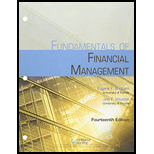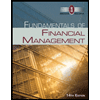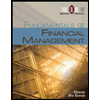
Bundle: Fundamentals of Financial Management, 14th + MindTap Finance, 1 term (6 months) Printed Access Card
14th Edition
ISBN: 9781305777118
Author: Eugene F. Brigham, Joel F. Houston
Publisher: Cengage Learning
expand_more
expand_more
format_list_bulleted
Concept explainers
Textbook Question
Chapter 5, Problem 27P
EFFECTIVE VERSUS NOMINAL INTEREST RATES Bank A pays 4% interest compounded annually on deposits, while Bank B pays 35% compounded daily.
- a. Based on the EAR (or EFF%), which hank should you use?
- b. Could your choice of banks be influenced by the fact that you might want to withdraw your funds during the year as opposed to at the end of the year? Assume that your funds must be left on deposit during an entire compounding period in order to receive any interest.
Expert Solution & Answer
Trending nowThis is a popular solution!

Students have asked these similar questions
What is the purpose of a case studty?
Why is it important for researchers? Please give the examples
Investors in corporate zero-coupon bonds include all of the following EXCEPT: A: Tax-exempt retirement plans B: Conservative investors who want to lock-in their returns C: Investors who are saving for their children's college education D: Investors who do not need current cash flows E: All of the above are potential zero-coupon investors
What are some of Airbnb Legal Issues?
How have Airbnb Resolved these Legal issues?WHat happened in the legal problem with Airbnb and Italy?
Chapter 5 Solutions
Bundle: Fundamentals of Financial Management, 14th + MindTap Finance, 1 term (6 months) Printed Access Card
Ch. 5 - Prob. 1QCh. 5 - Explain whether the following statement is true or...Ch. 5 - If a firms earnings per share grew from 1 to 2...Ch. 5 - Prob. 4QCh. 5 - Prob. 5QCh. 5 - The present value of a perpetuity is equal to the...Ch. 5 - Banks and other lenders are required to disclose a...Ch. 5 - What is a loan amortization schedule, and what are...Ch. 5 - Prob. 1PCh. 5 - Prob. 2P
Ch. 5 - FINDING THE REQUIRED INTEREST RATE Your parents...Ch. 5 - TIME FOR A LUMP SUM TO DOUBLE If you deposit money...Ch. 5 - TIME TO REACH A FINANCIAL GOAL You have 42,180.53...Ch. 5 - Prob. 6PCh. 5 - Prob. 7PCh. 5 - LOAN AMORTIZATION AND EAR You want to buy a car....Ch. 5 - PRESENT AND FUTURE VALUES FOR DIFFERENT PERIOOS...Ch. 5 - Prob. 10PCh. 5 - GROWTH RATES Shalit Corporations 2014 sales were...Ch. 5 - EFFECTIVE RATE OF INTEREST Find the interest rates...Ch. 5 - Prob. 13PCh. 5 - FUTURE VALUE OF AN ANNUITY Find the future values...Ch. 5 - Prob. 15PCh. 5 - Prob. 16PCh. 5 - EFFECTIVE INTEREST RATE You borrow 85,000; the...Ch. 5 - Prob. 18PCh. 5 - FUTURE VALUE OF AN ANNUITY Your client is 40 years...Ch. 5 - Prob. 20PCh. 5 - Prob. 21PCh. 5 - Prob. 22PCh. 5 - FUTURE VALUE FOR VARIOUS COMPOUNDING PERIODS Find...Ch. 5 - Prob. 24PCh. 5 - FUTURE VALUE OF AN ANNUITY Kind the future values...Ch. 5 - PV AND LOAN ELIGIBILITY You have saved 4,000 for a...Ch. 5 - EFFECTIVE VERSUS NOMINAL INTEREST RATES Bank A...Ch. 5 - Prob. 28PCh. 5 - Prob. 29PCh. 5 - Prob. 30PCh. 5 - REQUIRED LUMP SUM PAYMENT Starting next year, you...Ch. 5 - Prob. 32PCh. 5 - FV OF UNEVEN CASH FLOW You want to buy a house...Ch. 5 - AMORTIZATION SCHEDULE a. Set up an amortization...Ch. 5 - Prob. 35PCh. 5 - NONANNUAL COMPOUNDING a. You plan to make five...Ch. 5 - Prob. 37PCh. 5 - Prob. 38PCh. 5 - REQUIRED ANNUITY PAYMENTS Your father is 50 years...Ch. 5 - Prob. 40PCh. 5 - Prob. 41SPCh. 5 - Prob. 42IC
Knowledge Booster
Learn more about
Need a deep-dive on the concept behind this application? Look no further. Learn more about this topic, finance and related others by exploring similar questions and additional content below.Similar questions
- What are AIrbnb's Legal Foundations? What are Airbnb's Business Ethics? What are Airbnb's Corporate Social Responsibility?arrow_forwardDiscuss in detail the differences between the Primary Markets versus the Secondary Markets, The Money Market versus the Capital Market AND the Spot Market versus the Futures Market. Additionally, discuss the various Interest Rate Determinants listed in your textbook (such as default-risk premium.....).arrow_forwardHow can the book value still serve as a useful metric for investors despite the dominance of market value?arrow_forward
- How do you think companies can practically ensure that stakeholder interests are genuinely considered, while still prioritizing the financial goal of maximizing shareholder equity? Do you think there’s a way to measure and track this balance effectively?arrow_forward$5,000 received each year for five years on the first day of each year if your investments pay 6 percent compounded annually. $5,000 received each quarter for five years on the first day of each quarter if your investments pay 6 percent compounded quarterly. Can you show me either by hand or using a financial calculator please.arrow_forwardCan you solve these questions on a financial calculator: $5,000 received each year for five years on the last day of each year if your investments pay 6 percent compounded annually. $5,000 received each quarter for five years on the last day of each quarter if your investments pay 6 percent compounded quarterly.arrow_forward
- Now suppose Elijah offers a discount on subsequent rooms for each house, such that he charges $40 for his frist room, $35 for his second, and $25 for each room thereafter. Assume 30% of his clients have only one room cleaned, 25% have two rooms cleaned, 30% have three rooms cleaned, and the remaining 15% have four rooms cleaned. How many houses will he have to clean before breaking even? If taxes are 25% of profits, how many rooms will he have to clean before making $15,000 profit? Answer the question by making a CVP worksheet similar to the depreciation sheets. Make sure it works well, uses cell references and functions/formulas when appropriate, and looks nice.arrow_forward1. Answer the following and cite references. • what is the whole overview of Green Markets (Regional or Sectoral Stock Markets)? • what is the green energy equities, green bonds, and green financing and how is this related in Green Markets (Regional or Sectoral Stock Markets)? Give a detailed explanation of each of them.arrow_forwardCould you help explain “How an exploratory case study could be goodness of work that is pleasing to the Lord?”arrow_forward
- What are the case study types and could you help explain and make an applicable example.What are the 4 primary case study designs/structures (formats)?arrow_forwardThe Fortune Company is considering a new investment. Financial projections for the investment are tabulated below. The corporate tax rate is 24 percent. Assume all sales revenue is received in cash, all operating costs and income taxes are paid in cash, and all cash flows occur at the end of the year. All net working capital is recovered at the end of the project. Year 0 Year 1 Year 2 Year 3 Year 4 Investment $ 28,000 Sales revenue $ 14,500 $ 15,000 $ 15,500 $ 12,500 Operating costs 3,100 3,200 3,300 2,500 Depreciation 7,000 7,000 7,000 7,000 Net working capital spending 340 390 440 340 ?arrow_forwardWhat are the six types of alternative case study compositional structures (formats)used for research purposes, such as: 1. Linear-Analytical, 2. Comparative, 3. Chronological, 4. Theory Building, 5. Suspense and 6. Unsequenced. Please explainarrow_forward
arrow_back_ios
SEE MORE QUESTIONS
arrow_forward_ios
Recommended textbooks for you
 EBK CONTEMPORARY FINANCIAL MANAGEMENTFinanceISBN:9781337514835Author:MOYERPublisher:CENGAGE LEARNING - CONSIGNMENT
EBK CONTEMPORARY FINANCIAL MANAGEMENTFinanceISBN:9781337514835Author:MOYERPublisher:CENGAGE LEARNING - CONSIGNMENT Fundamentals of Financial Management (MindTap Cou...FinanceISBN:9781285867977Author:Eugene F. Brigham, Joel F. HoustonPublisher:Cengage Learning
Fundamentals of Financial Management (MindTap Cou...FinanceISBN:9781285867977Author:Eugene F. Brigham, Joel F. HoustonPublisher:Cengage Learning Fundamentals of Financial Management, Concise Edi...FinanceISBN:9781285065137Author:Eugene F. Brigham, Joel F. HoustonPublisher:Cengage Learning
Fundamentals of Financial Management, Concise Edi...FinanceISBN:9781285065137Author:Eugene F. Brigham, Joel F. HoustonPublisher:Cengage Learning

EBK CONTEMPORARY FINANCIAL MANAGEMENT
Finance
ISBN:9781337514835
Author:MOYER
Publisher:CENGAGE LEARNING - CONSIGNMENT

Fundamentals of Financial Management (MindTap Cou...
Finance
ISBN:9781285867977
Author:Eugene F. Brigham, Joel F. Houston
Publisher:Cengage Learning

Fundamentals of Financial Management, Concise Edi...
Finance
ISBN:9781285065137
Author:Eugene F. Brigham, Joel F. Houston
Publisher:Cengage Learning
Portfolio return, variance, standard deviation; Author: MyFinanceTeacher;https://www.youtube.com/watch?v=RWT0kx36vZE;License: Standard YouTube License, CC-BY